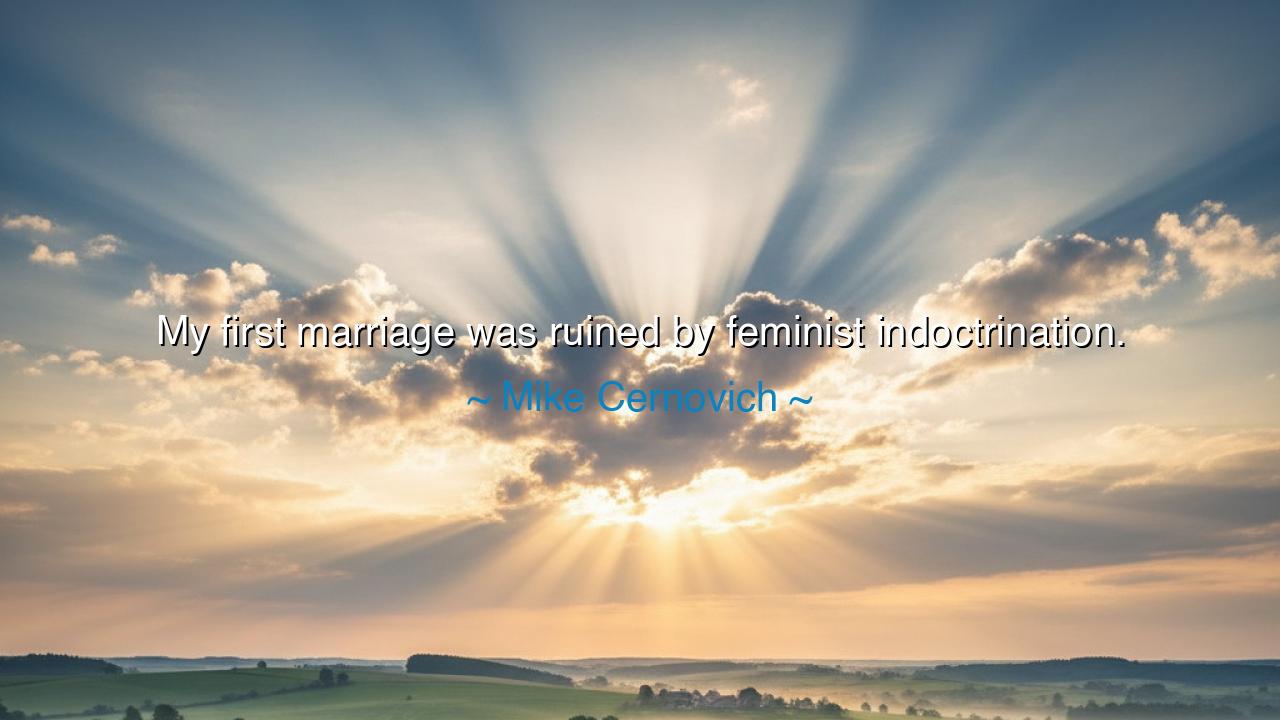
My first marriage was ruined by feminist indoctrination.






The words of Mike Cernovich, “My first marriage was ruined by feminist indoctrination,” are a cry born from the collision of belief, identity, and expectation — a lament that speaks not only of one man’s personal loss, but of the greater tension between ideology and intimacy. Beneath his statement lies a timeless struggle: how the forces that shape our minds can also shape — and sometimes shatter — our most sacred bonds. In these few words, Cernovich exposes the pain that arises when ideas, once meant to liberate, begin to divide instead; when philosophy, instead of guiding love toward harmony, turns it into a battlefield of pride and resentment.
To understand the spirit of his lament, we must first understand the age in which it was born. The modern world, in its quest for freedom and equality, has seen the rise of many movements — each seeking to restore balance to a society long ruled by imbalance. Feminism, at its heart, began as a noble call for justice: a cry for women to be heard, respected, and allowed to stand as equals beside men. It was a rebellion against centuries of silence. Yet, like all human movements, its pure fire could be distorted when stripped of its compassion and wielded as a weapon rather than a light. Cernovich’s grief springs from this distortion — from a form of feminism that no longer sought harmony between the sexes, but competition; not mutual upliftment, but domination of one ideal over another.
This conflict between principle and partnership is not new. The ancients, too, warned that when philosophy loses balance, it destroys what it sought to save. The story of Medea and Jason in Greek myth is one such tale: a union once bound by love, undone by pride, betrayal, and the clash of power. Jason abandoned Medea in pursuit of ambition; Medea, in her fury, struck back with intellect sharpened into vengeance. Their tragedy was not only personal — it was symbolic of the eternal war between heart and ideology, between the call of the soul and the doctrines of the mind. Likewise, in Cernovich’s reflection, we glimpse a modern tragedy: love suffocated by the weight of ideology, affection replaced by argument, and devotion replaced by distrust.
When he says his marriage was “ruined by feminist indoctrination,” he does not merely speak of one belief system; he speaks of any doctrine that blinds human beings to their shared humanity. Indoctrination — whether political, religious, or cultural — is the loss of personal discernment, the surrender of love’s living warmth to cold abstraction. Marriage, the ancients taught, is a sacred alchemy: the blending of two distinct spirits into harmony. For such harmony to endure, both must retain humility and balance — the masculine strength and the feminine wisdom intertwined, neither exalted nor diminished. But when either spirit is taught to view the other as enemy rather than complement, the sacred fire flickers and dies.
Cernovich’s words, then, become not an accusation, but a warning. They urge us to remember that true equality is not sameness — it is balance. The ancient Chinese spoke of this in the dance of yin and yang: two forces opposite yet inseparable, each giving meaning to the other. When yin dominates without yang, the world falls into passivity; when yang rules without yin, it becomes harsh and destructive. In the same way, when modern ideologies forget the sacred balance between the sexes, they breed confusion and loneliness. For no partnership can thrive when both partners compete for supremacy instead of communion.
Let this be the lesson passed to those who listen: do not allow the doctrines of the age — however noble they may seem — to overtake the wisdom of the heart. Seek understanding over victory, and cooperation over control. Remember that love is not a battlefield of ideas, but a temple of patience and humility. The ancients said that “he who conquers himself is greater than he who conquers a city.” So too in marriage: one must conquer ego to preserve union. Ideologies may change, but the truth of human connection remains eternal — that man and woman, each incomplete alone, find strength only through respect and tenderness toward one another.
Thus, the lament of Mike Cernovich becomes a modern parable — not a rejection of feminism’s ideals, but a reminder of what happens when any creed forgets compassion. The ancients would have said: wisdom lies not in extremes, but in balance. And so it is with love. If we can learn to honor equality without erasing difference, to seek justice without forgetting mercy, then marriage — and all human relationship — will flourish once more. For the heart, not ideology, must be the final teacher of how to love and how to live.






AAdministratorAdministrator
Welcome, honored guests. Please leave a comment, we will respond soon